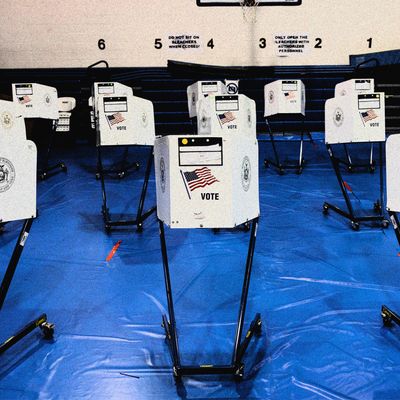
Photo: Christian Monterrosa/Bloomberg via Getty Images
New York voters, already preparing to elect a new mayor, are also voting on four referendum questions that, if approved, will amend the City Charter in ways that drastically limit the power of individual City Council members to kill development projects. Voting to get affordable housing built significantly more quickly might be even more important than who we put in charge of City Hall for the next 48 months.
“Affordability is the single biggest crisis facing New Yorkers, and often it looks like housing affordability. Right now, our system makes it too difficult, too expensive, too time consuming to build the affordable housing we need,” Richard Buery, a former deputy mayor who chaired the most recent charter revision commission, told me back in July.
That’s putting it mildly. During the 1920s, according to the Vital City think tank, New York built nearly 730,000 homes,more than quadruple the city’s current, anemic pace. Even in the 1960s, production moved twice as fast as at present. By comparison, project approvals take only 30 days in Houston, compared to 15 months in San Francisco, according to a RAND study – but in New York, it takes an average of 2.5 years to secure zoning changes before a project can break ground, which adds an estimated 11 to 16 percent to the cost of building housing. There is broad agreement that these delays contribute to our current 1.4 percent vacancy rate, the lowest level since 1968.
“We need a lot more housing than we have now. Some would say 500,000 to a million new units in the next 10 years,” estimates Jamie Rubin, a former state housing commissioner who currently chairs the New York City Housing Authority. “Everything takes too long,” he told me. “When you come in as mayor on your first day, if you say you’re going to create 10,000 new units of housing, it may take you 10 years to do that. So telling people that you’ve done it at the end of the first year simply can’t be accurate.”
Buery says much of the blame for the current crisis lies with the City Council. “What we’ve seen over the past few decades is the emergence of a tradition, of member deference, which means that the council basically defers to the member in the affected district. If you have a council person who’s opposed to development, nothing happens,” he said. “The mayor doesn’t bother to veto it because he knows that the council will override.”
Individual council members often waste years letting noisy, not-in-my-backyard activists control the outcome of even trivially small and obviously worthy housing projects, like the rezoning of Bruckner Boulevard or the 12-year battle for badly needed senior apartments that ultimately got killed at the Elizabeth Street Garden. “We heard from former council people who talked about what happens when they support housing. Death threats, attacks,” Buery told me.
That’s where the ballot questions come in. If approved by voters, the City Charter would give expedited approvals to some affordable housing projects, especially in districts that have traditionally blocked development, and empower an appeals panel, made up of the mayor, the City Council speaker and the borough president of the affected area, to override the wishes of local council members when necessary.
Council members, understandably upset about the potential loss of power, unsuccessfully sued to try and block the charter questions from appearing on the ballot, and are currently mounting a campaign urging New Yorkers to vote “No’ on the referenda.
“I feel like this council sometimes is carrying the sins of the past. This particular council has been very pro-housing,” Councilwoman Nantasha Williams of Queens told me. “Out of all the projects that have come to the council, we’ve approved over 93% of those projects that will deliver over 130,000 units of housing.”
It is true that Williams and a few other council members have commendably partnered with the Adams administration to get affordable housing built. Brooklyn Members Crystal Hudson and Chi Osse got a long-overdue rezoning of Atlantic Avenue that will bring density and thousands of affordable apartments to a 13-block corridor currently marked by low-rise auto repair shops and a homeless shelter. In Manhattan, members Keith Powers and Erik Bottcher teamed up to help complete the rezoning of Midtown South in ways that will speed the conversion of underutilized office buildings into apartments.
Williams herself has spent years negotiating a massive, historic 300-block rezoning of Jamaica that is expected to create 12,000 new apartments. Sandy Nurse in Brooklyn and Julie Won in Queens are making progress at completing big rezonings at Broadway Junction and Long Island City, respectively. And the full Council approved the historic City of Yes five-borough rezoning that is expected to make future development easier.
But alongside the Council’s productive, pro-development members are representatives of areas where, decade after decade, little or no housing gets built, according to a tracker maintained by the New York Housing Conference. The NIMBY politicians who represent these no-growth areas are the reason the Charter questions are on the ballot, and passage will give other leaders a means to bypass them.
At the top of the ticket, independent mayoral candidate Andrew Cuomo supports passage of the ballot questions, while the Republican nominee, Curtis Sliwa, is vocally opposed and Democrat Zohran Mamdani – obviously reluctant about alienating Democratic council members – has remained noncommittal. Voters can’t force the next mayor to take action on housing, but we can give him an important tool to speed up the process.
“No matter what happens with the Charter questions, the next mayor is gonna have to stand up, because this is going to be the single thing, along with public safety, that’s going to determine the success or failure of his administration,” Rubin predicts. “The mayor is going to have to stand up and declare that this is the problem he’s going to solve. And he is not going to make everybody happy with his solutions.”
Sign Up for the Intelligencer Newsletter
Daily news about the politics, business, and technology shaping our world.
Vox Media, LLC Terms and Privacy Notice

